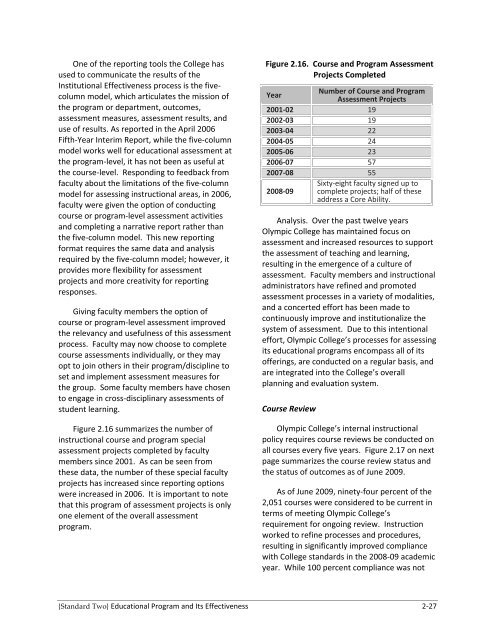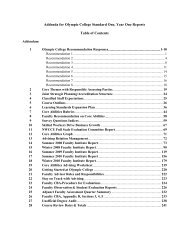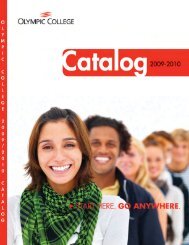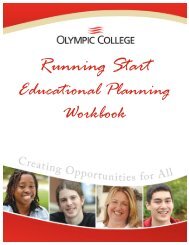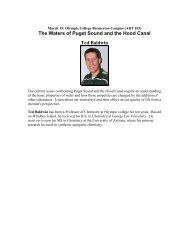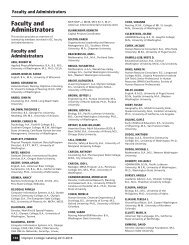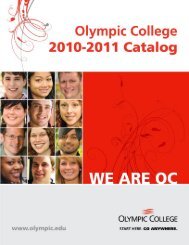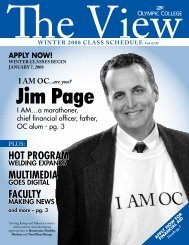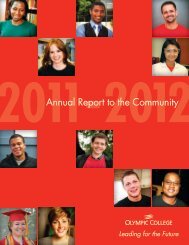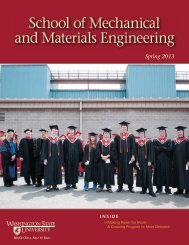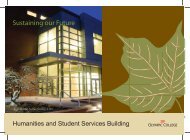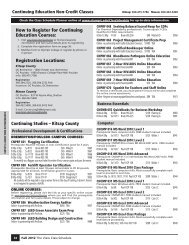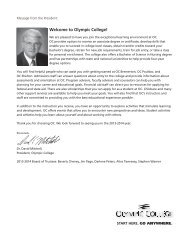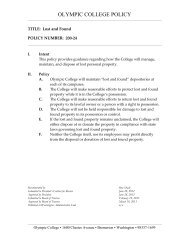Self-Study Report - Olympic College
Self-Study Report - Olympic College
Self-Study Report - Olympic College
Create successful ePaper yourself
Turn your PDF publications into a flip-book with our unique Google optimized e-Paper software.
One of the reporting tools the <strong>College</strong> has<br />
used to communicate the results of the<br />
Institutional Effectiveness process is the fivecolumn<br />
model, which articulates the mission of<br />
the program or department, outcomes,<br />
assessment measures, assessment results, and<br />
use of results. As reported in the April 2006<br />
Fifth-Year Interim <strong>Report</strong>, while the five-column<br />
model works well for educational assessment at<br />
the program-level, it has not been as useful at<br />
the course-level. Responding to feedback from<br />
faculty about the limitations of the five-column<br />
model for assessing instructional areas, in 2006,<br />
faculty were given the option of conducting<br />
course or program-level assessment activities<br />
and completing a narrative report rather than<br />
the five-column model. This new reporting<br />
format requires the same data and analysis<br />
required by the five-column model; however, it<br />
provides more flexibility for assessment<br />
projects and more creativity for reporting<br />
responses.<br />
Giving faculty members the option of<br />
course or program-level assessment improved<br />
the relevancy and usefulness of this assessment<br />
process. Faculty may now choose to complete<br />
course assessments individually, or they may<br />
opt to join others in their program/discipline to<br />
set and implement assessment measures for<br />
the group. Some faculty members have chosen<br />
to engage in cross-disciplinary assessments of<br />
student learning.<br />
Figure 2.16 summarizes the number of<br />
instructional course and program special<br />
assessment projects completed by faculty<br />
members since 2001. As can be seen from<br />
these data, the number of these special faculty<br />
projects has increased since reporting options<br />
were increased in 2006. It is important to note<br />
that this program of assessment projects is only<br />
one element of the overall assessment<br />
program.<br />
Figure�2.16.��Course�and�Program�Assessment�<br />
Projects�Completed�<br />
Year�<br />
Number�of�Course�and�Program�<br />
Assessment�Projects<br />
2001�02 19<br />
2002�03 19<br />
2003�04 22<br />
2004�05 24<br />
2005�06 23<br />
2006�07 57<br />
2007�08 55<br />
Sixty-eight faculty signed up to<br />
2008�09� complete projects; half of these<br />
address a Core Ability.<br />
Analysis. Over the past twelve years<br />
<strong>Olympic</strong> <strong>College</strong> has maintained focus on<br />
assessment and increased resources to support<br />
the assessment of teaching and learning,<br />
resulting in the emergence of a culture of<br />
assessment. Faculty members and instructional<br />
administrators have refined and promoted<br />
assessment processes in a variety of modalities,<br />
and a concerted effort has been made to<br />
continuously improve and institutionalize the<br />
system of assessment. Due to this intentional<br />
effort, <strong>Olympic</strong> <strong>College</strong>’s processes for assessing<br />
its educational programs encompass all of its<br />
offerings, are conducted on a regular basis, and<br />
are integrated into the <strong>College</strong>’s overall<br />
planning and evaluation system.<br />
Course�Review�<br />
<strong>Olympic</strong> <strong>College</strong>’s internal instructional<br />
policy requires course reviews be conducted on<br />
all courses every five years. Figure 2.17 on next<br />
page summarizes the course review status and<br />
the status of outcomes as of June 2009.<br />
As of June 2009, ninety-four percent of the<br />
2,051 courses were considered to be current in<br />
terms of meeting <strong>Olympic</strong> <strong>College</strong>’s<br />
requirement for ongoing review. Instruction<br />
worked to refine processes and procedures,<br />
resulting in significantly improved compliance<br />
with <strong>College</strong> standards in the 2008-09 academic<br />
year. While 100 percent compliance was not<br />
{Standard�Two} Educational Program and Its Effectiveness 2-27


